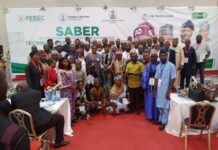Stakeholders at a one day capacity building W









 orkshop on National Gender Policy Implementation in Umuahia, Abia State capital, have expressed worry over Nigeria’s global ranking in gender issues, saying the time had come for the passage of the Gender Equality bill by the National Assembly.
orkshop on National Gender Policy Implementation in Umuahia, Abia State capital, have expressed worry over Nigeria’s global ranking in gender issues, saying the time had come for the passage of the Gender Equality bill by the National Assembly.
Nigeria is said to rank 128 out of 149 countries globally and 27 out of 33 countries in Sub Sahara Africa in gender issues.
In her keynote address, the Abia State Director of the National Orientation Agency (NOA) Dr Ngozi Okechukwu, said the training organized in collaboration with Literacy Integration and Formal Education (LIFE) Foundation was aimed at advancing the National Gender Policy of 2006 to reduce systematic gender inequalities.
She lamented that for inexplicable reasons the bill has suffered several set backs even after the federal government published the 5-year strategic framework on the National gender policy in 2008 developed under the leadership of the Federal Ministry of Women Affairs and Social Development to enable the successful implementation of the core principles of the National Gender Policy.
“Again, in the year 2011, the Gender and Equal Opportunities Bill was presented to the National Assembly… Ten years later, the bill is yet to be passed into law. Thus, the National Gender policy has no legal leg to stand on. The status quo has severe social economic implications for Nigeria generally and in its quest to adjust to the needs of modern realities,” She said.
The NOA Director said the ugly experiences of gender based violence during the coronavirus lockdown had highlighted the imperative of arriving at significant outcome to tackle gender based issues.
In her lecture, the founder of LIFE Foundation, Chief Elvira Salleras, said a National Gender Policy held the key to Nigeria’s socio-political and economic development.
She charged participants to take the message of gender equality to the communities in order to deal with myths and gender stereotypes through which the society tend to view women.
In his presentation, Mr Richard Okoro of Rural Development Partners, said gender issues gained prominence after the Beijing Conference, saying that gender issues should be taken seriously by governments and communities in order to check the abuses perpetrated in the name of tradition.
There was an interactive session on Identifying harmful ,cultural,religious and social gender based practices in Abia State which reproduce gender inequalities and effects of Gender disparity and Socio – economic consequences.













